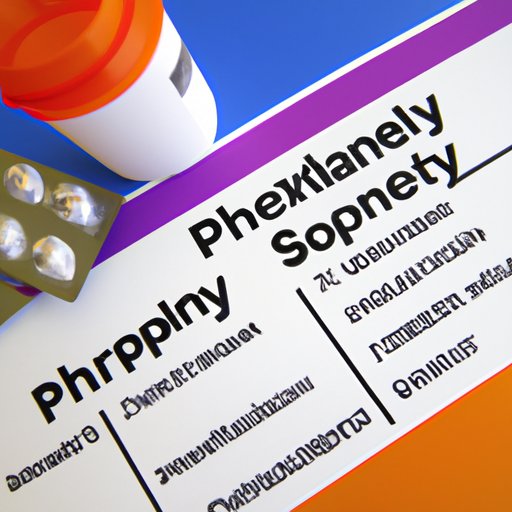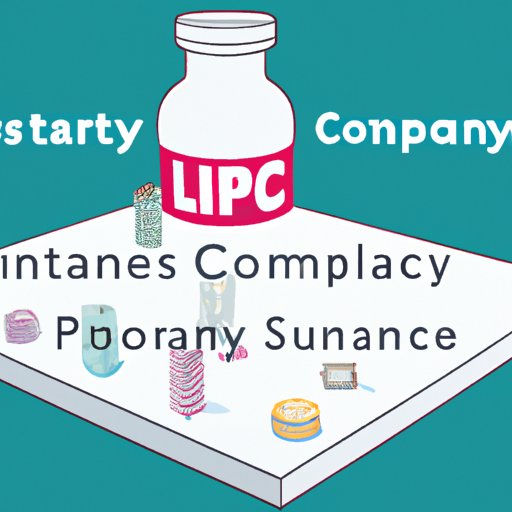Introduction
Opening a pharmacy is an exciting venture that can be rewarding both personally and financially. However, this endeavor comes with certain financial requirements that must be taken into consideration prior to launching the business. Understanding the cost of starting a pharmacy is essential for successful planning and execution of the project. By taking the time to analyze the different components of the startup process, you can create a budget that takes into account all of the expenses associated with launching a pharmacy.
Analyzing the Cost of Starting a Pharmacy: What to Consider
There are many factors to consider when determining the cost of starting a pharmacy. These include licensing and registration costs, location and lease costs, equipment and supplies, staffing costs, and marketing costs. Each of these elements should be taken into account in order to create an accurate budget for your pharmacy business.
Licensing and Registration Costs
The first step in opening a pharmacy is obtaining the proper licenses and registrations. The cost of licensing and registration varies by state, but typically includes application fees, background checks, and fingerprinting. According to the National Association of Boards of Pharmacy (NABP), the average cost of licensure is $1,000-$2,500. Additionally, some states require additional documents such as a surety bond or proof of liability insurance, which can add to the cost of starting a pharmacy.
Location and Lease Costs
Finding the right location for your pharmacy is essential for its success. The cost of leasing or purchasing a space depends on the size of the building and its location. According to the Small Business Administration, commercial leases typically range from $5 to $25 per square foot. In addition to the monthly rent, there may also be other costs associated with the lease, such as maintenance fees and insurance.
Equipment and Supplies
The cost of equipment and supplies is another important factor to consider when starting a pharmacy. The cost of outfitting a pharmacy with the necessary equipment and supplies can vary greatly depending on the size of the store and the types of products being sold. According to a study by the University of Maryland, the average cost of outfitting a pharmacy with equipment and supplies is around $200,000.
Staffing Costs
Hiring and training staff is another essential component of starting a pharmacy. Depending on the size of the store and the number of employees needed, the cost of hiring and training staff can range from a few hundred dollars to several thousand dollars. Additionally, the cost of wages and benefits should also be taken into account when creating a budget for your pharmacy business.
Marketing Costs
Marketing is an important part of any business, and a pharmacy is no exception. The cost of marketing a pharmacy can vary greatly depending on the type of marketing activities being undertaken. For example, creating a website, designing promotional materials, and running online ads can all add to the cost of starting a pharmacy. According to the Small Business Administration, the average cost of marketing a business is between 7 and 8 percent of total revenue.

Estimating Startup Costs for Your Pharmacy Business
Once you have taken into account all of the different costs associated with launching a pharmacy, it is time to calculate the total expense of starting your business. To do this, you will need to estimate the cost of each element of the startup process and then add them together to get a rough estimate of the total cost. It is important to note that these estimates may change over time as you gain a better understanding of the expenses associated with launching a pharmacy.
Calculating the Expense of Launching a Pharmacy
To calculate the estimated expense of launching a pharmacy, you will need to add up the cost of licensing and registration, location and lease costs, equipment and supplies, staffing, and marketing. You should also include any other costs associated with getting your business up and running, such as legal fees and insurance. Once you have a total estimated cost, you can use this figure to create a budget for your pharmacy business.
Understanding the Financial Impact of Starting a Pharmacy
It is important to understand the financial impact of starting a pharmacy before making any investments. Although launching a pharmacy can be a lucrative endeavor, it is important to remember that there are risks associated with any business venture. Therefore, it is essential to have a thorough understanding of the potential financial rewards and risks associated with launching a pharmacy.
Exploring the Investment Needed to Open a Pharmacy
The amount of money needed to open a pharmacy will depend on the size of the store, the type of products being sold, and the location of the business. Generally speaking, the larger the store and the higher the quality of products, the more money will be required to launch the business. Additionally, the cost of opening a pharmacy in a high-traffic area may be higher than in a smaller town due to the increased cost of leasing a space.

Breaking Down the Financial Requirements for Opening a Pharmacy
When it comes to financing a pharmacy, there are three main categories to take into consideration: initial capital investment, working capital, and operating costs. Initial capital investment is the amount of money needed to purchase or lease a location, purchase equipment and supplies, and cover the cost of licensing and registration. Working capital is the amount of money needed to cover the day-to-day operations of the business, such as payroll and inventory costs. Operating costs refer to the ongoing costs associated with running the business, such as rent and utilities.

Investigating the Price Tag of Opening a Pharmacy
In addition to the costs mentioned above, there are other expenses associated with opening a pharmacy that should be taken into consideration. These include taxes, insurance, and legal services. Taxes vary by state and the type of business, so it is important to research the tax implications of owning a pharmacy in your area. Insurance is also necessary to protect the business from potential liabilities, and legal services may be needed to ensure compliance with local laws and regulations.
Conclusion
Opening a pharmacy is an exciting and potentially lucrative venture, but it is also a major undertaking that requires careful planning and a thorough understanding of the costs associated with starting a business. This article has provided an overview of the cost of starting a pharmacy, including licensing and registration costs, location and lease costs, equipment and supplies, staffing costs, and marketing costs. Additionally, it has discussed the financial requirements for opening a pharmacy, including initial capital investment, working capital, and operating costs. Finally, it has explored the price tag of opening a pharmacy, including taxes, insurance, and legal services.
With a comprehensive understanding of the total cost of starting a pharmacy, you can create a realistic budget and plan for launching your business. By taking the time to analyze the different components of the startup process, you can create a budget that takes into account all of the expenses associated with launching a pharmacy and ensure that you have the resources necessary to make your venture a success.
(Note: Is this article not meeting your expectations? Do you have knowledge or insights to share? Unlock new opportunities and expand your reach by joining our authors team. Click Registration to join us and share your expertise with our readers.)
